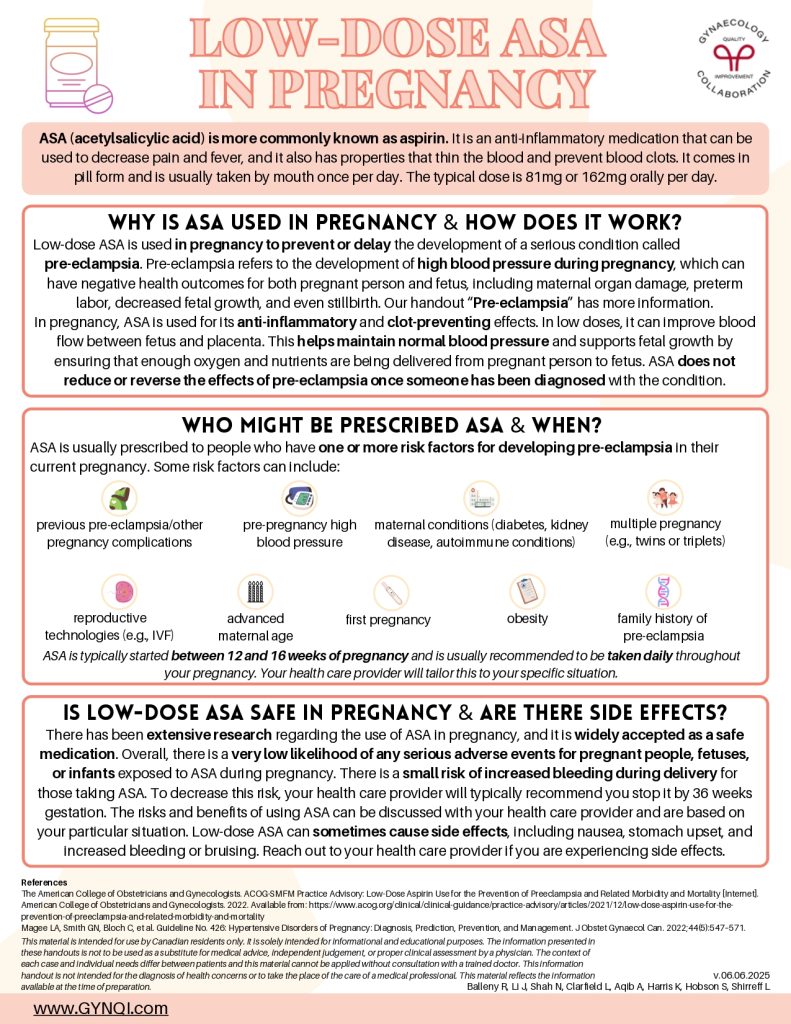
Low-dose Asa In Pregnancy
ASA (acetylsalicylic acid) is more commonly known as aspirin. It is an anti-inflammatory medication that can be used to decrease pain and fever, and it also has properties that thin the blood and prevent blood clots. It comes in pill form and is usually taken by mouth once per day. The typical dose is 81mg or 162mg orally per day.
Why Is ASA Used In Pregnancy & How Does It Work?
Low-dose ASA is used in pregnancy to prevent or delay the development of a serious condition called pre-eclampsia. Pre-eclampsia refers to the development of high blood pressure during pregnancy, which can have negative health outcomes for both pregnant person and fetus, including maternal organ damage, preterm labor, decreased fetal growth, and even stillbirth. Our handout “Pre-eclampsia” has more information. In pregnancy, ASA is used for its anti-inflammatory and clot-preventing effects. In low doses, it can improve blood flow between fetus and placenta. This helps maintain normal blood pressure and supports fetal growth by ensuring that enough oxygen and nutrients are being delivered from pregnant person to fetus. ASA does not reduce or reverse the effects of pre-eclampsia once someone has been diagnosed with the condition.
Who Might Be Prescribed ASA & When?
ASA is usually prescribed to people who have one or more risk factors for developing pre-eclampsia in their current pregnancy. Some risk factors can include:
- Previous pre-eclampsia/other pregnancy complications
- Pre-pregnancy high blood pressure
- Maternal conditions (diabetes, kidney disease, autoimmune conditions)
- Multiple pregnancy( e.g., twins or triplets)
- Reproductive technologies (e.g., IVF)
- Advanced maternal age
- First pregnancy
- Obesity
- Family history of pre-eclampsia
ASA is typically started between 12 and 16 weeks of pregnancy and is usually recommended to be taken daily throughout your pregnancy. Your health care provider will tailor this to your specific situation.
Is Low-Dose ASA Safe In Pregnancy & Are There Side Effects?
There has been extensive research regarding the use of ASA in pregnancy, and it is widely accepted as a safe medication. Overall, there is a very low likelihood of any serious adverse events for pregnant people, fetuses, or infants exposed to ASA during pregnancy. There is a small risk of increased bleeding during delivery for those taking ASA. To decrease this risk, your health care provider will typically recommend you stop it by 36 weeks gestation. The risks and benefits of using ASA can be discussed with your health care provider and are based on your particular situation. Low-dose ASA can sometimes cause side effects, including nausea, stomach upset, and increased bleeding or bruising. Reach out to your health care provider if you are experiencing side effects.



